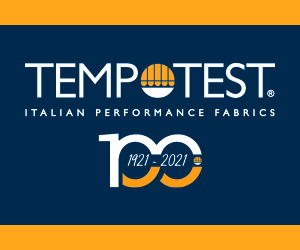Italians Start Forerunner to Valdese Weavers 100 Years Ago
May 18, 2015
VALDESE, North Carolina—As part of its 100th year, Valdese Weavers continues its five year $31 million capital improvement program started in 2012, unveils its Centennial fabric collection at Showtime in June and will soon publish an anniversary book to commemorate its first 100 years in business according to Mike Shelton, President & CEO.
The celebration will continue at Neocon in Chicago and other events are planned including community celebrations, employee events, a charity golf tournament and customer events in New York and Chicago, Shelton says.
This book will document its founding by Italian Protestants from the Cottian Alps of Northern Italy who came to the North Carolina hills to escape religious persecution 100 years ago.
The book will also explore its story, highlight Valdese brands and “give credit to the thousands of employees that have made Valdese Weavers what it is today, the largest decorative jacquard mill in North America,” says Mike Shelton. Shelton joined Valdese in 1988 and was named President in 1997.
In 1935, as America began to recover from the Great Depression, this Italian immigrant company, originally called Waldensian Swiss Embroidery, would eventually become Valdese Weavers with nearly a million square feet of manufacturing capacity today and approximately $175 million in sales, F&FI estimates.
“One hundred years is a landmark anniversary most companies never achieve,” Shelton continues. “We are the leader in the design and manufacturing of jacquard fabrics for residential and commercial markets; six branded companies: Valdese Weavers, Valdese Weavers Contract, Circa 1801, Home Fabrics, Valdese International Products (VIP) and Dicey Fabrics,” Shelton adds. He says Valdese companies develop fabrics from value to high-end price points and cover the residential, contract, hospitality, health care and specialty markets.
The Valdese name is derived from the Waldensians, pre-Reformation Protestants from the Cottian Alps of northern Italy who arrived in North Carolina in 1893 to try farming in America but found the rocky terrain of the foothills less than fertile for the cultivation of crops. They turned to textiles, establishing manufacturing as a way of life for themselves and generations to follow.
Twenty years after the company began, North Carolina businessman Harley Shuford purchased the company out of receivership when it faltered during the Great Depression of 1935. He changed its name to Valdese Weavers Inc., introducing jacquard woven fabrics to the company’s product line. For the next 30 years, Valdese Weavers served the U.S. residential furniture and fabric industries as a supplier of decorative jacquard fabrics.
As the company’s domestic business expanded, it began to develop opportunities outside the U.S. Initially, international sales were limited to English-speaking countries, but business grew steadily and by 2006, Valdese Weavers was supplying its fabrics to 24 countries around the globe.
In 2015, Valdese Weavers hired Reinhard Backhausen to manage business development throughout Europe. Based in Vienna, Backhausen is a sixth generation textile maker and former president of Backhausen Interior Textiles GmbH, a 165-year-old textile producer in Austria.
“Valdese Weavers reached beyond its residential roots in the late ‘90s and began developing fabrics for the contract industry, mainly the office and hospitality trades,” Shelton says. “Throughout the 2000’s, the contract business experienced substantial growth in sales and market share, which prompted the creation of a separate branded company to manage the market, Valdese Weavers Contract. By 2008 Valdese Weavers Contract had become, and remains, one of the largest suppliers of fabric to the contract market.
Valdese also wanted to supply complementary fabrics they did not manufacture, such as silks and velvets. In 2005, Valdese International Products (VIP) was created to produce these products on a global level, and source them directly to manufacturers.
“Valdese Weavers expanded again in 2007, acquiring the Circa 1801 and Home Fabrics companies,” Shelton adds. “With the addition of these brands, the company enhanced its position in the boutique and high-end residential markets. The company grew once more in 2015, with the acquisition of Dicey Fabrics, a maker of performance plains and Jacquard designs. “The Dicey acquisition also brought on the capability for yarn making, further enhancing Valdese Weavers’ vertical integration,” Shelton says.
Valdese recently completed a two-year capital improvement campaign focused on its Burke County, North Carolina, facilities, Shelton says. “Launched in the summer of 2013, the campaign keeps the company and its six brands at the leading edge of textile design, weaving and finishing through upgrades to machinery and technology. The company upgraded existing looms and purchased 30 new high-speed Dornier looms in 2013, the most reliable, productive and versatile weaving machines on the market. New looms brought not only increased speed, but also automatic filling capability,” he points out.
“You have to evaluate every aspect of the manufacturing environment for potential improvements,” says Shelton. “The machinery doesn’t operate in a vacuum, but works in concert with building systems.”
Shelton indicates that although the two-year project is completed, plans for the next round of improvements are already in the works. “We’re not in the business of being static. We make significant investments in the company an ongoing priority,” he says.
















